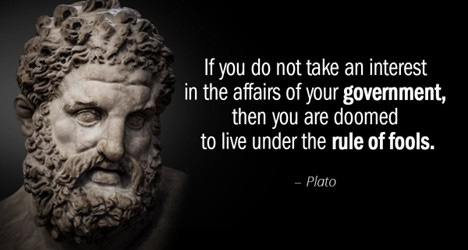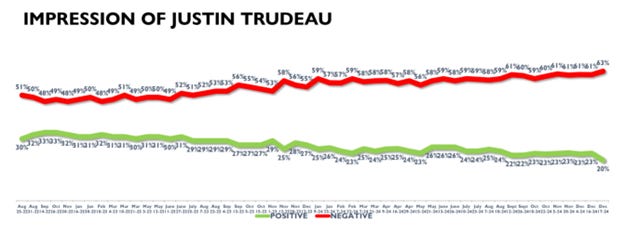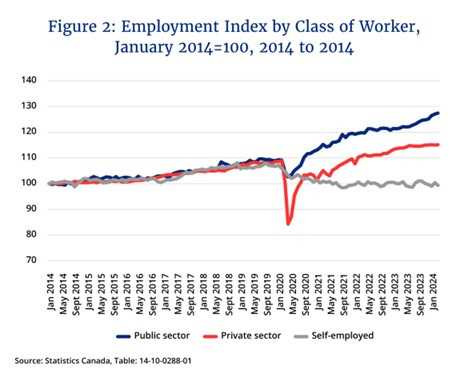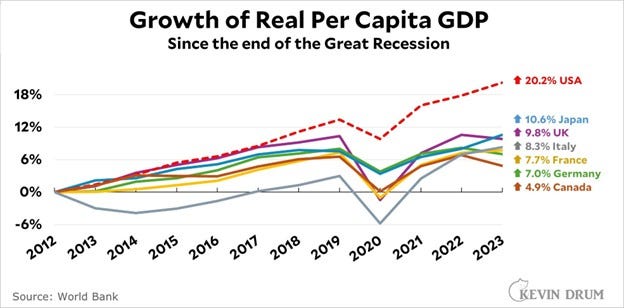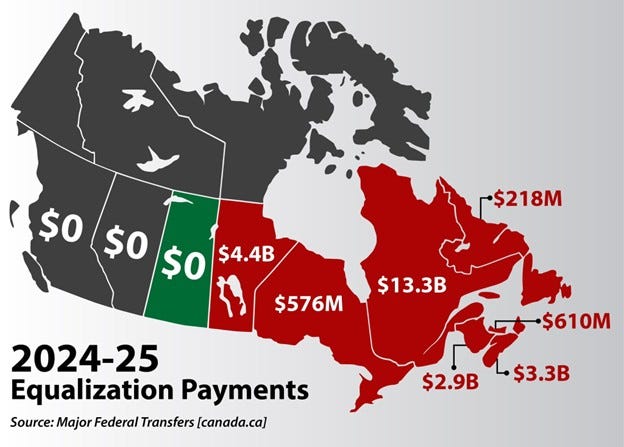Good Riddance to Bad Rubbish
Well, it happened. I honestly didn’t think he’d do it. After almost a decade in office and with his and the Liberal Party’s popularity numbers plummeting, Justin Trudeau has finally resigned. Or to be more exact, will resign once the party selects its new leader. In the interim Parliament has been prorogued until March 24th.
It should not come as a surprise to anyone that I think this is long overdue. Trudeau has been arguably the worst Prime Minister in Canadian history. Some of it is due to the changing times as I’ve argued before, but much of it is simply due to his party’s arrogance and the wrongheaded policies that have undermined both the economy and the foundations of Canadian society. Topping this list are mass immigration and the rapid expansion of the bureaucracy.
Together these policies have seen Canada’s Real GDP growth trail every other G7 nation.
The Trudeau’s government’s failures also include a failure to address the Foreign Interference Scandal which alleges that numerous MPs are covertly worked with foreign governments as well as numerous corruption scandals.
It seems the only thing the government is able to do well is kill its own citizens. MAID has thrived under Trudeau’s leadership.
Despite the disaster that Trudeau has been, the Liberals will find it challenging to replace him for the simple reason that he did not create this disaster on his own. Most of those seen as possible replacements are or were members of his cabinet and so also bear responsibility for what has occurred. Finding a leader who is untainted by the stink of the Trudeau Liberals will be hard.
A recent Angus Reid poll had the Liberals polling at 16%.
His possible replacements don’t fare much better.
You might think that the resignation and terrible state of the Liberal Party would put me in a good mood. For the most part it has. For the moment. Canadians are right to celebrate Trudeau’s resignation, but we must remember that he didn’t do all this damage on his own and too many of those who share his responsibility for the damage that’s been done have not resigned. For this nightmare to end, the “unindicted conspirators” who run the Liberal party have to go as well.
It is in my nature to worry. I worry that a new leader will give the Liberals and the legacy media the opportunity to do what the Dems did when Biden “stepped down.” Specifically craft a false narrative around the new leader. Canadians voted for the Liberals 3 times – well 30% to 40% did but let’s not split hairs – will they do it again?
A victory over the Trudeau Liberals and a return to normalcy are within sight. Now is not the time to rest on our laurels.
You can have Western Civilization, or you can have Multiculturalism. You can’t have both.
"There is no core identity, no mainstream in Canada.”
-- Justin Trudeau, 2015
In 1996 political scientist Samuel P. Huntington published "The Clash of Civilizations and the Remaking of the World Order." I’ve been (very) slowly working my way through it and I’m continually struck by his incredible insight and ability to identify issues 30 years ago which have become significant in today’s world.
Most recently I came across a passage warning of the dangers of multiculturalism:
"The American multiculturalists similarly reject their country's cultural heritage. Instead of attempting to identify the United States with another civilization, however, they wish to create a country of many civilizations, which is to say a country not belonging to any civilization and lacking a cultural core. History shows that no country so constituted can long endure as a coherent society. A multicivilizational United States will not be the United States, it will be the United Nations."
Put more succinctly, you can have Western Civilization, or you can have Multiculturalism. You can’t have both.
The same warning can be applied to Canada. Prime Minister Pierre Elliot Trudeau announced Canadian multiculturalism in 1971, and his son Justin has supercharged it through mass immigration. Together they have set Canada on a path to what Trudeau Jr. referred to as “the post-national state” but what is, in reality, a road to ruin.
Canada is filled with people of varying backgrounds, Irish, French, Chinese, to name just a few. Citizens of Canada are faced with a choice. They can choose to be Irish-, French-, and Chinese-Canadians with different cultural heritages but a primary allegiance to Canada or are they can be Irish, French, and Chinese people living in Canada. The former will strengthen the country, the latter destroy it.
It is long past time that Western countries started insisting that newcomers adopt Western values and leave their “age-old hatreds” where they came from.
If it’s time for change (and it is), then let’s make some changes.
I hate taxes. The only thing I hate more than paying the government for things I don’t want or need (ex. the CBC and the Post Office), is watching them waste it. I’m watching stories regarding the Department of Government Efficiency (DOGE) in the US with a mixture of fascination and jealousy. Why can’t we have something like that?
So when Scott Moe, the Premier of Saskatchewan posted the graphic below showing which provinces benefit from the transfer payments I two thoughts struck me:
How much money is this costing the average Canadian?
Doesn’t this kill competition?
The first question is simple math. The total shown on the map is $25.3 billion and about 29 million Canadians pay taxes. That works out to $872 per Canadian taxpayer.
The second question is more philosophical and likely depends on where you are on the political spectrum. It is akin to asking “is welfare a disincentive to work?” I believe it can help but over a long time is a disincentive.
To take one example, in 2016-2017 Quebec received $10 billion in transfer payments and it has never fallen below that level. What’s more, Quebec has the highest tax rate, so it is collecting more tax/taxpayer at the provincial level than any other province but still requires the most money from the federal government. In effect, taxpayers from across Canada are paying to subsidize Quebec’s inefficient government.
This makes the answer to the second question clear; transfer payments are killing competitiveness. The solution is to end the practice. If some provinces are unable to provide reasonably comparable levels of public services without subsidies from the other provinces people in those provinces should vote in better governments or move to better provinces.
I’d like my $872 back please.




